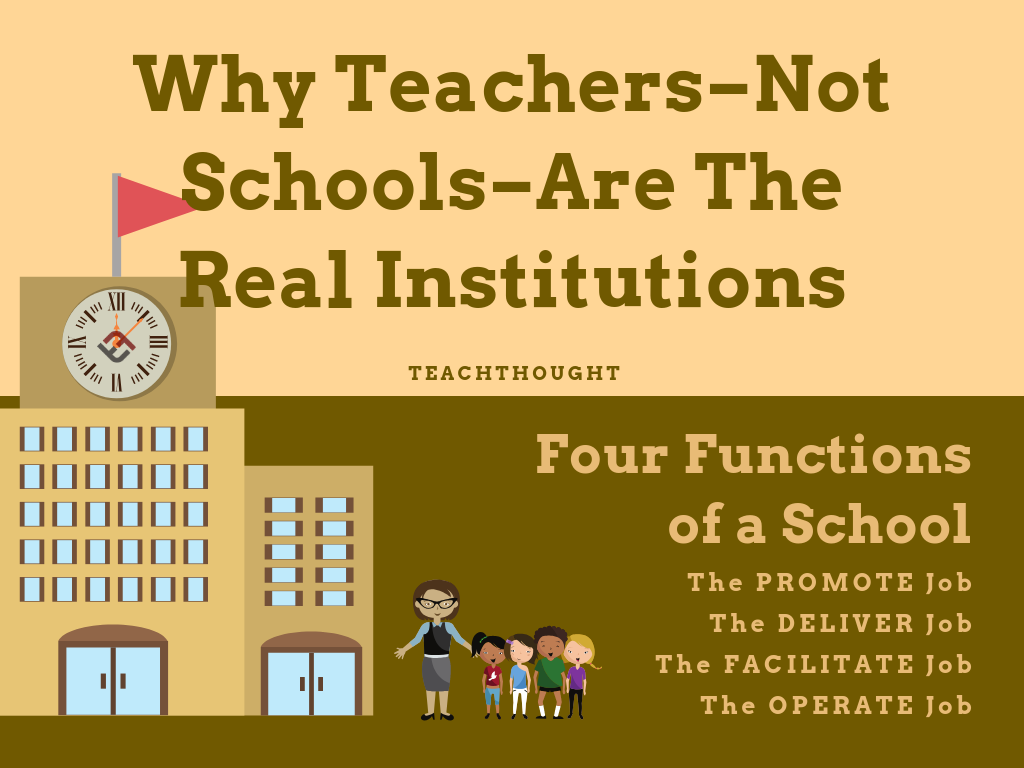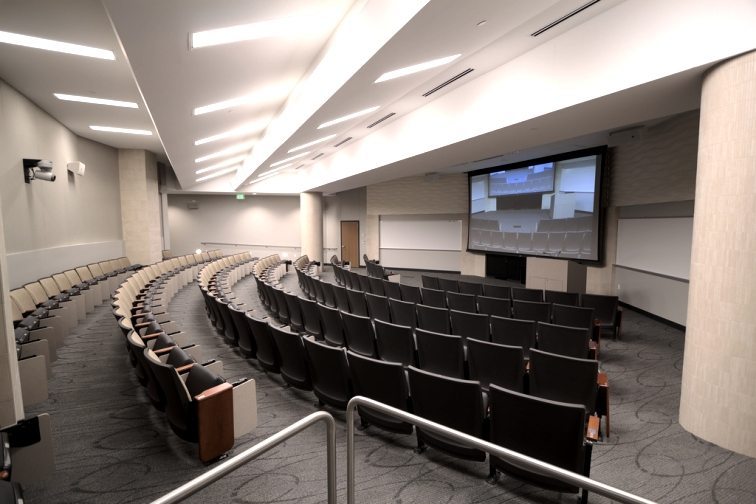
Why Teachers–Not Schools–Are The Real Institutions
by TeachThought Staff
“I am a teacher, therefore I teach,” is a phrase that seems to describe your job pretty well. After all, teaching is what you are getting paid for.
But times are changing and such narrow perspective could become dangerous. At the very least, you are probably leaving parts of your professional career in the hands of others, failing to fully materialize the value that you could generate. In the worst case scenario, though, you could simply be rendered irrelevant.
If we look beyond all the labels and terms conventionally associated with the teacher profession, and if we ignore all the semantics and the constraining “baggage” that comes with them, it is easy to see that you are an institution. Not necessarily a legal institution, but rather a value-generating institution.
Simply put, you are directly responsible for a student’s partial accumulation of knowledge and skills.
Teachers as Institutions
Although realizing that you are an institution is a first step in the right direction, that is not enough. In the 1960 Harvard Business Review article “Marketing Myopia,” Theodore Levitt explains how companies fall victim to their own narrow perspective on what they actually do:
“The railroads did not stop growing because the need for passenger and freight transportation declined. That grew. The railroads are in trouble today not because the need was filled by others (cars, trucks, airplanes, even telephones), but because it was not filled by the railroads themselves. They let others take customers away from them because they assumed themselves to be in the railroad business rather than in the transportation business. The reason they defined their industry wrong was because they were railroad-oriented instead of transportation-oriented; they were product-oriented instead of customer-oriented.”
In your case, the customer is the student. And you are in the education business, rather than the teaching business, which tends to be heavily shaped by the general technological level and the way the society and, thus, the education system is presently organized. It is a distinction that suggests that, as an educational institution, the jobs that you do (yes, already do!) go beyond teaching.
In my recent presentation “Unlocking Innovation in Education through Meaningful Technology (A General Model for Ed-Tech),” which was also mentioned on TeachThought as well, I identified the basic jobs that an educational institution (or “school”) must perform. It all begins with the identification of the steps that the student is taking during the education process, whether that refers to a single course or a four-year program:
CONSIDER skills, programs, schools, ACQUIRE knowledge, skills, certifications, and ACTUALIZE new (intellectual, professional) identity.
Four Functions of a School
Now, as with any service-providing institution or organization, the school must match the student’s behavior in order for a mutual engagement to take place. Consequently, the basic jobs that a school must perform are: PROMOTE, DELIVER, FACILITATE, and OPERATE. And, since we have already established that you are an educational institution, these are your basic jobs too.
The PROMOTE Job
This is the job corresponding to the student’s CONSIDER. Depending on the characteristics of your student population, your organizational affiliation, and your level of involvement, the job could take various forms. The most passive form is your reputation, whether you are actively managing it or not. At the other end of the spectrum, you could be already involved in a dialogue with the prospective students. You might have already developed a following or, even better, a community.
The DELIVER Job
This is the job corresponding to the student’s ACQUIRE and is what we conventionally think of as teaching. And this job too takes various forms. At the minimum, it is your classroom teaching activity. In other circumstances, though, this job could go well beyond teaching in that it establishes a platform for the student’s learning process. In other words, this is the job where you enable the student to learn in an integrated, unifying manner — whether the knowledge and skill comes from the interaction with you, from the interaction with other students, from individual study, from family and friends, or from some or all of these sources.
The FACILITATE Job
Corresponding to the student’s ACTUALIZE, this is the job where you are supposed to help the student close the loop of development (whether that is intellectual, career, or professional development). Having just acquired new knowledge, skills, and potentially a certification, the student is in the process of re-inserting himself or herself into the environment, in a position that is perceived as an advancement. In some circumstances, such as public K-12 education, this job is embedded in the system to some extent. Nonetheless, in other instances, you might have already developed strong relationships with the entities with which your students will engage next, facilitating a smoother actualization process.
The OPERATE Job
As an institution, you have to create a lasting environment, in which your activities can be performed repeatedly over an extended period of time. In short, and from the institutional point of view, you have to ensure that you are a lasting entity. This job too might be embedded in the system, where the public school you teach at provides a physical classroom, offers you a computer to use, and performs all the other supporting tasks. In some cases, though, you might be already handling these jobs yourself. Using the latest technologies available, you could be performing underlying tasks such as student information management, accounting, and information technology management.
Conclusion
This holistic view of what you fundamentally do provides valuable guidance in an education space that quickly evolves toward a student-centric environment. Whether you remain affiliated to an existing organization or try to start your own, this framework of your basic jobs could help you maximize the value that you bring to the table. In conclusion, I would say, make this your manifesto and always remember: “Hey teacher, you are a school. So, start thinking and acting like one.”
Cristian Mitreanu is an entrepreneur, researcher, and advisor. He is the creator of Ofmos, a casual video game that will change the way we learn business (www.ofmos.com). Follow him on Twitter @Spointra.
Image attribution flickr users acousticdimensions, woodleywonderworks, and dfidukdepartmentofinternationaldevelopment



